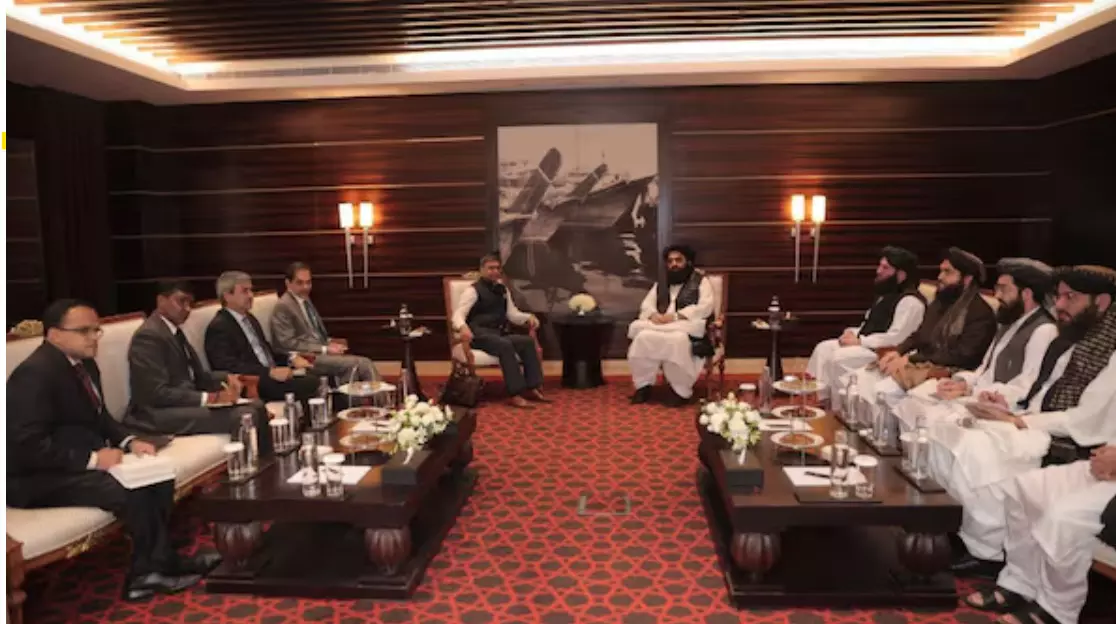A tactical tango?
India’s diplomatically sound engagement with the Afghan Taliban in Dubai has sparked misplaced reactions in Pakistan around former’s strategic and economic motives

It has been more than a month since India’s top diplomatic team met the Afghan Taliban leadership in Dubai in an extraordinary move to reach out to them, a development already discussed in detail in these columns. Further to this, more reactions from Pakistan on the meeting have started trickling in. Some reactions in the mainstream Pakistani media, in the context of backchannel diplomacy between India and the Afghan Taliban, suggest that the diplomatic move has resulted in the permanent closure of the Ghani administration’s Embassy in New Delhi.
Subsequently, the Taliban’s Charge d’Affaires (CdA) in Abu Dhabi was invited by the Indian Embassy in the UAE for the Republic Day celebrations in the Emirates’ capital. Additionally, according to the Pakistani press, major economic considerations have pushed India closer to the Taliban, with several reasons cited for India’s outreach to the Afghan Taliban. This reflects the growing closeness between India and the Taliban.
First, the international community has been continuously engaging with the Taliban government, and perhaps India did not want to be left behind. Besides the U.S. meeting the Taliban in Qatar, China has also been expanding its relationship with Kabul in security, economic, and political spheres. Furthermore, regional countries as well as the Arab world have been cautiously engaging with the Afghan interim government. Therefore, India does not want to be seen as ‘strategically excluded’ from Afghanistan.
Secondly, soon after Kabul fell, the Indian media and opposition parties attempted to portray the victory of the Afghan Taliban as a ‘victory of Pakistan.’ These, of course, are Pakistani perceptions. Pakistan claims that the Indian government has been criticised for its “weak neighbourhood” policy due to “back-to-back setbacks” in the Maldives and Bangladesh. Re-engagement with the Afghan Taliban is partly seen as an attempt by the Indian government to counter criticism of its Afghanistan policy.
Third, significant economic considerations have pushed New Delhi closer to the Taliban. Prior to the fall of Kabul, India was involved in infrastructure and energy projects in Afghanistan worth around USD 3 billion. Again, these are purely Pakistani apprehensions and not necessarily based on facts.
Moreover, lithium has become a highly sought-after commodity globally. Several studies estimate Afghanistan’s mineral potential at more than $1 trillion. This is a new angle that the Pakistani press is emphasising. Major mineral resources include chromium, copper, gold, iron, lead, zinc, lithium, marble, and precious and semiprecious stones—many of which are essential for India’s electronic vehicle (EV) industry. Many Western firms have been setting up businesses in India for this reason. Lithium, in particular, is crucial for EV batteries. Hence, Afghanistan could potentially fulfill India’s demand for these critical minerals through Iran’s Chabahar port. These, however, remain Pakistan’s impressions of India-Taliban ties.
Meanwhile, in a separate but not entirely isolated development, Iran and Afghanistan called for increased cooperation during a visit to Kabul by Tehran's Foreign Minister on January 26, the highest-ranking Iranian official to visit the Afghan capital since the Taliban takeover in 2021. Iranian Foreign Minister Abbas Araghchi met with his Afghan counterpart, Amir Khan Muttaqi, and Taliban government Prime Minister Hassan Akhund during a one-day visit to discuss bilateral relations. However, the two countries continue to clash over issues such as migration and water resources.
The discussions focused on economic cooperation, the situation of Afghan migrants in Iran, border issues, and water rights. It is worth noting that many countries closed their embassies in Kabul or downgraded diplomatic relations after the Taliban takeover nearly four years ago. However, Iran has maintained active diplomatic ties with Afghanistan’s new rulers, though it is yet to officially recognise the Taliban government.
Several Iranian delegations have visited Afghanistan over the years, including a parliamentary delegation in August 2023 to discuss water rights. That said, tensions between the two countries have escalated in recent years over water resources and the construction of dams on the Helmand and Harirud rivers. It is also pertinent to mention that Afghan migrants in Iran have been urged to return to Afghanistan “with dignity.” However, returning Afghans have accused Iranian authorities of harassment, wrongful deportation, and physical abuse. Iranian President Masoud Pezeshkian has stated that Tehran is repatriating illegal nationals “in a respectful manner.” Iran shares more than 900 kilometres of border with Afghanistan and hosts one of the world's largest refugee populations—mostly Afghans fleeing decades of war. Significantly, the flow of Afghan migrants has increased since the Taliban took power.
In another notable development, India is expected to reject Russia’s offer to join the “Afghan Quad,” a coalition that includes Pakistan and China, reflecting its reluctance to engage with adversaries on Kabul’s future. The four-nation bloc—Iran being the fourth member—was formed with the declared objective of stabilising Afghanistan, aligning with its members’ shared regional interests. However, for India, joining a coalition that includes its long-standing adversary, Pakistan, would conflict with its strategic calculations. At least, this is the concern of Afghanistan watchers who are not necessarily Indian.
In this context, Russian Foreign Minister Sergey Lavrov expressed hope earlier this month that India would join the group, calling it “the right thing to do in Afghanistan.” However, Pakistan’s involvement is seen as “an automatic red flag” for India, according to Kabir Taneja, Deputy Director and fellow at the Observer Research Foundation’s (ORF) Strategic Studies Programme in New Delhi. Shruti Pandalai, a Delhi-based strategic affairs expert specialising in India’s foreign and security policy, noted that Afghanistan’s stability is a shared regional interest for Russia and India. While worsening relations between Islamabad and Kabul might encourage India to respond more positively to Moscow’s diplomatic overtures, Pandalai argued that the presence of China and Pakistan in the bloc would do “little for New Delhi’s strategic interests.”
The writer is a retired IPS officer, Adviser NatStrat, and a former National Security Advisor in Mauritius. Views expressed are personal



